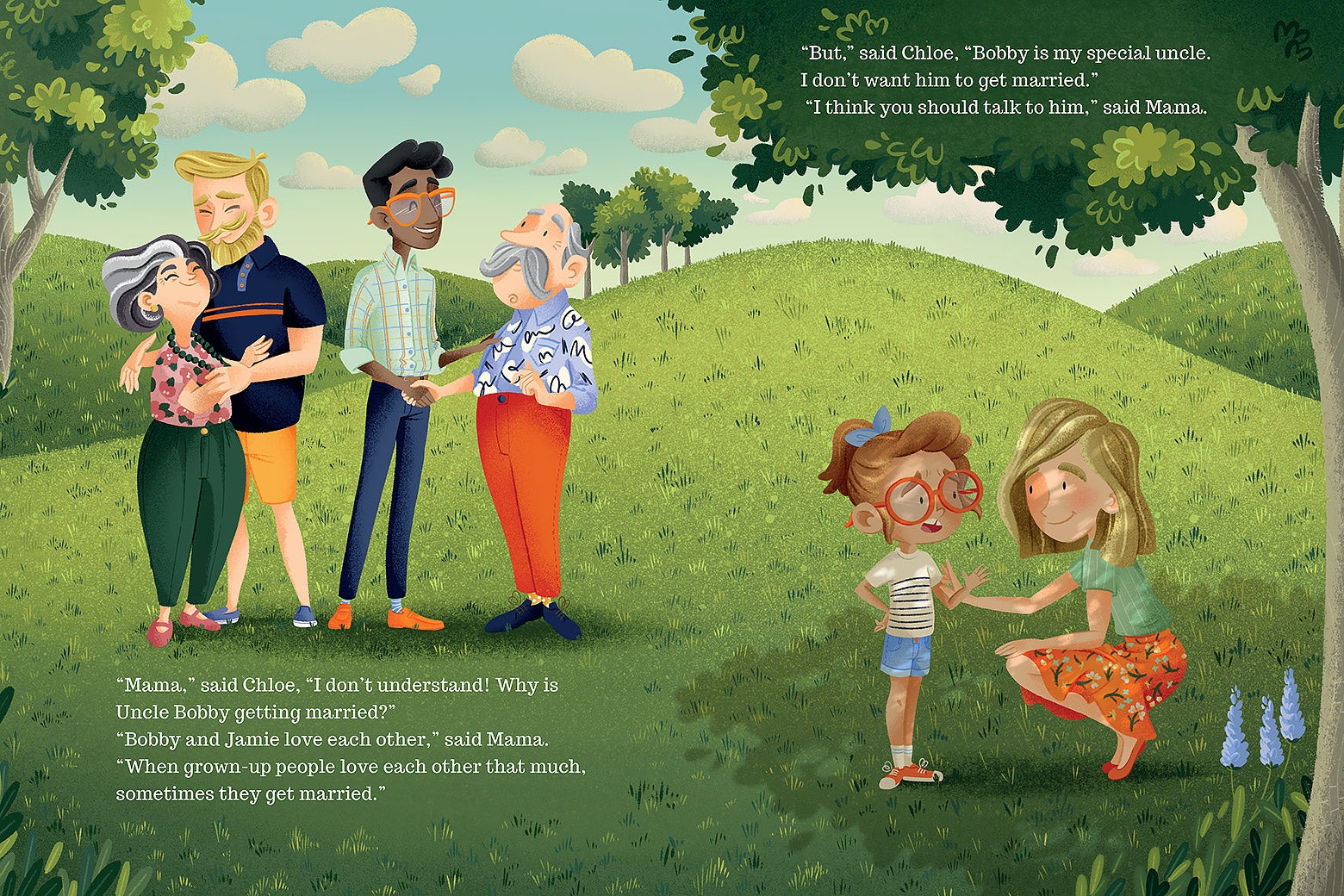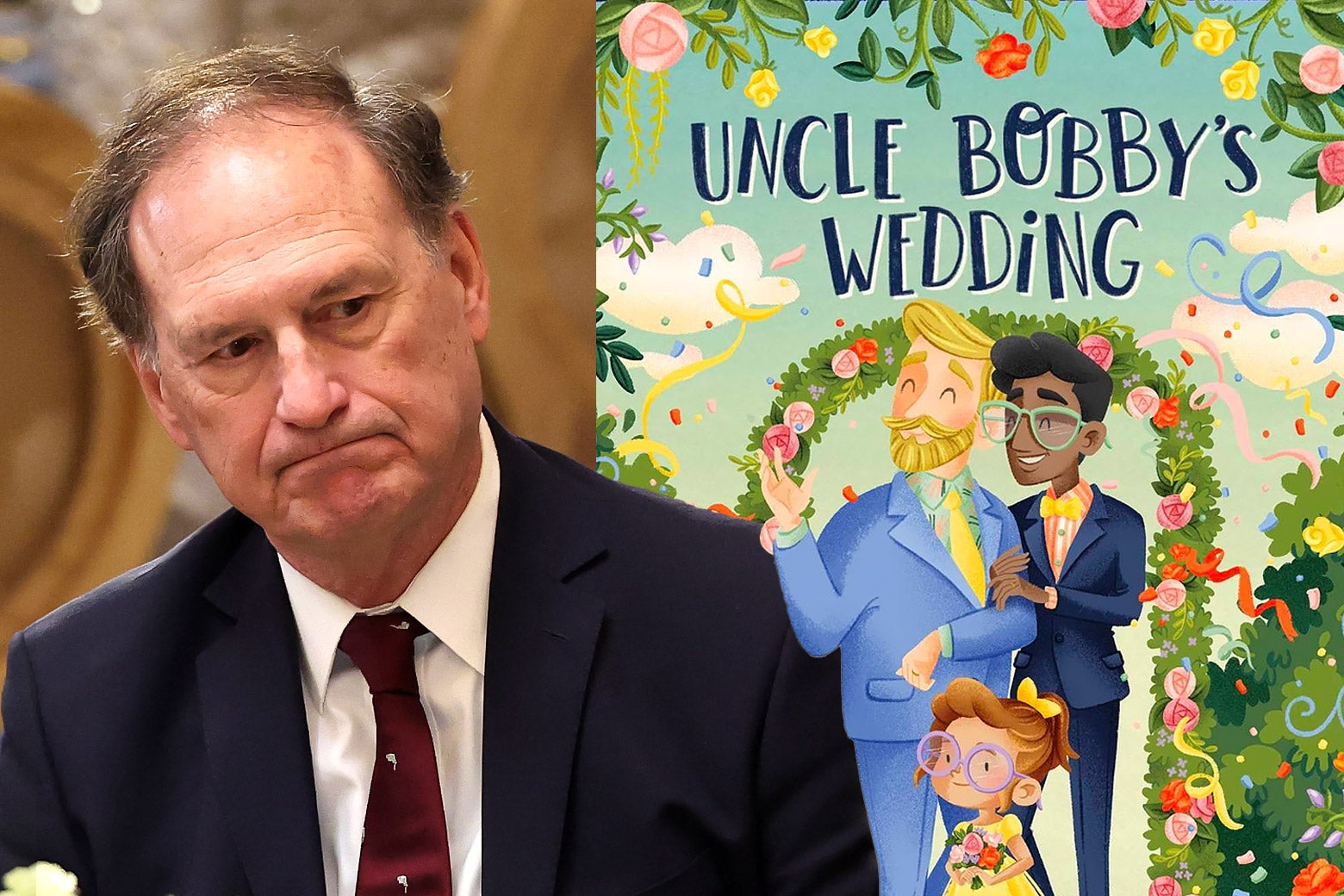Sign up for the Slatest to get the most insightful analysis, criticism, and advice out there, delivered to your inbox daily.
The Supreme Court’s conservative justices unleashed a torrent of homophobia on Tuesday as they debated the meaning and propriety of several LGBTQ-themed children’s books. Throughout arguments in Mahmoud v. Taylor, these justices voiced concern—and at times, outright disgust—toward these books for portraying LGBTQ+ people as normal and loving. They argued that parents should have a First Amendment right to shield their children from such material in public schools, ostensibly to protect them from exposure to diverse families under the auspices of religious liberty. Justice Samuel Alito reserved special ire for Uncle Bobby’s Wedding, a gentle picture book that homophobic parents initially attempted to censor when it debuted in 2008. Alito suggested, over the objections of Justice Sonia Sotomayor, that the book is devious propaganda aimed at indoctrinating children who harbor reservations about same-sex marriage.
He is wrong. Alito did not just arguably miss the point of the book; he fundamentally distorted it. As author Sarah Brannen told me on Wednesday, “The book is written very simply, in language a 5-year-old can understand.” Brannen speculated that Alito “was being deliberately misleading” in his summary of Uncle Bobby’s Wedding from the bench, part of a broader effort to vilify both the school board and same-sex families. This paranoid homophobia lies at the heart of the whole case. The Republican-appointed justices made it abundantly clear that they think woke educators are inculcating children with radical, pro-LGBTQ+ values in violation of their parents’ religious beliefs. These justices sound eager to give parents a veto over classroom materials to prevent their children from learning about LGBTQ+ families. And they have zero concern for the profoundly stigmatizing message this censorship sends to children who belong to those very families.
Brannen wrote and illustrated Uncle Bobby’s Wedding in 2005, shortly after same-sex marriage became legal in Massachusetts. Upon publication in 2008, Uncle Bobby’s Wedding faced multiple challenges from parents who wanted it removed from the library, becoming the eighth most challenged book of the year in the United States. In 2022, Maryland’s Montgomery County Board of Education chose to include it on the curriculum for young students, prompting some religious parents to “opt out” their children from seeing the books. The board eventually scrapped its opt-out policy, finding that it had become unworkable: So many parents were objecting that the policy gave them a veto power over the curricula, with educators scrapping materials rather than managing the logistics of endless opt-outs. The parents then sued, alleging that the board violated their First Amendment right to free exercise by denying them the chance to shield their children from LGBTQ+ literature.
Uncle Bobby’s Wedding was one of a handful of picture books scorned by these parents—who are now plaintiffs in Mahmoud, the case SCOTUS heard on Tuesday. Sotomayor mentioned the book early on, asking the plaintiffs’ attorney, Eric Baxter, how “mere exposure” to “two men getting married” could spur a religious objection.* (“None of them are even kissing,” she noted.) Alito quickly leapt in. “I’ve read that book,” he declared, like a homophobic uncle at Thanksgiving dinner preparing to lecture his family about something he saw on Fox News. The justice asked Rassbach: “Do you think it’s fair to say that all that is done in Uncle Bobby’s Wedding is to expose children to the fact that there are men who marry other men?” He continued:
“I don’t think anybody can read that and say, well, this is just telling children that there are occasions when men marry other men, that Uncle Bobby gets married to his boyfriend, Jamie. And everybody’s happy and … everyone accepts this—except for the little girl, Chloe, who has reservations about it. But her mother corrects her: ‘No, you shouldn’t have any reservations about this.’ As I said, it has a clear moral message.”
Sotomayor then interrupted. “Wait a minute,” she said, audibly irritated. “The reservation is about …” But Alito stepped in before she could finish. “Can I finish, please?” he asked, his voice rising. Chief Justice John Roberts gave him the floor to continue his tirade.
Sotomayor’s direct rebuke of Alito was highly unusual: When justices seek to address their colleagues on the bench during arguments, they typically go through the attorney before them. Sotomayor felt it was urgently important to address Alito’s claim—and rightly so, because he was wrong. Alito claimed that Chloe had moral “reservations” about Uncle Bobby marrying his boyfriend—as if her “reservations” were about a man marrying another man. But the book makes it abundantly clear that Chloe’s reservations are not about Uncle Bobby’s sexual orientation. Rather, she frets that he won’t have as much time to spend with her.

A few minutes later, Sotomayor made this point to Rassbach. “The character, the child character, wasn’t objecting to same-sex marriage,” the justice said. “She was objecting to the fact that marriage would take her uncle away from spending more time with her, correct?” Rassbach protested that he wasn’t “sure that’s correct,” saying that “for a child of that age,” it is “hard to express what their actual concerns are.” Sotomayor was having none of it. “Well, when the character says ‘He’ll have less time for me,’ ” she said, “it seems self-evident. Isn’t it?” (It is.)
Even after Sotomayor’s throwdown, Alito couldn’t let the topic go. He returned to it later, resorting to the squishier claim that the book “expresses the idea subtly” that same-sex marriage “is a good thing.”
On Wednesday, Brannen confirmed to Slate that Sotomayor was right and Alito was wrong. “No one in the book has any problem with same-sex marriage,” the author said. “Everyone in the story supports Bobby and Jamie’s decision to marry, including Chloe. She’s thrilled about the wedding after she gets to know Jamie better” and is “completely supportive.” Brannen said she was “dismayed” by the way Alito characterized the book; she first wondered if Alito hadn’t bothered to read it, but realized he must have after he started quoting from it. She then “wondered if Justice Alito was being deliberately misleading” in his characterization, “because he’s clearly a very intelligent person and the book is very simple.” Brannen did think Sotomayor’s rejoinder was “wonderful,” telling me: “I was so moved to hear her talking about my book and to show that she really understood it.”
So what was the message of Uncle Bobby’s Wedding? “That change can be hard for children,” Brannen told me. “Change in their families can be hard, but Uncle Bobby’s Wedding shows that can be good.” When writing the book, Brannen was not attempting to trick children into supporting same-sex weddings, but to impart a more timeless message about the importance of open-mindedness when life presents challenges. She depicted a gay wedding as an utterly normal occurrence that fades into the background of the book’s central narrative. And it was this choice that may have broken Alito’s brain: He could not grasp the idea that no one in the book objects to Bobby’s sexual orientation, injecting a fraught conflict over homosexuality that does not exist on the page.
The justice’s literary butchering of a children’s book might seem like a silly distraction. But in an important way, the episode cuts to the rotten core of Mahmoud itself. The plaintiffs frame these books as propaganda designed to brainwash their children into supporting LGBTQ+ rights. But all that books like Uncle Bobby’s Wedding actually do is depict LGBTQ+ families as they exist in the real world. Is it propaganda to see two moms with their child at the grocery store? To see a transgender dad with his son on the playground? Are parents’ religious beliefs really offended when their child is exposed to different kind of families?
Perhaps the plaintiffs think so. But surely a public education system has no obligation to accommodate such extreme convictions. After all, those other families send their kids to public schools, too. The Montgomery County Board of Education adopted these books specifically so that their curriculum would reflect the diversity of their student body. Why shouldn’t children of LGBTQ+ parents see themselves reflected in classroom literature? And what kind of message does it send when a teacher must excuse other students from class before reading a book that features nontraditional families—or cuts it altogether for fear of provoking a federal lawsuit?
Brannen described this stigma as her “great concern.” If the plaintiffs prevail, she told me, the decision will “enable grievous discrimination against LGBTQ families and children.” If schools let children opt out of class to avoid these books, or dump them altogether, it tells a child with LGBTQ+ parents “that there is something wrong with them.” Montgomery County’s school board tried to avoid inflicting such discrimination on its diverse student body. Now the Supreme Court may impose it on the entire country.
Correction, April 24, 2025: This article originally misidentified the plaintiffs’ attorney in this case. It is Eric Baxter, not Eric Rassbach.
link


